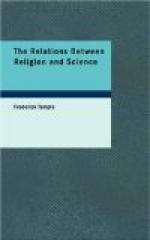The teachers of other religions besides the Christian have claimed supernatural powers, and have professed to give a supernatural message. This is a strong evidence of the deep-seated need in the human soul for such a direct communication from God to man. Men seem to need it so much that without it they are unable to accept the truth, or to hold it long if they do accept it. All who thus claim supernatural authority must, of course, justify their claim. They must justify their message to the human conscience. What they teach must be an advance towards, and finally an expression of, the Supreme Moral Law. And if they profess to have miraculous power they must give reasonable evidence that such power is really theirs. But if they fail in this, still the fact remains that their very claim must answer to something in the spiritual nature of man, or it would not be so invariably made nor so largely successful.
It seems as if, whatever may be the ground of belief when once revelation has penetrated into the soul, the exercise of supernatural power was needed to procure that access in the first instance. We believe because we find our consciences satisfied, and we bring up our children in such discipline of conscience that they too shall have sufficient training to recognise and hold fast divine truth. And if we had lived at the time and could have had our eyes opened to see the spiritual power of the Christian Faith, we might have believed without any external evidence at all.




